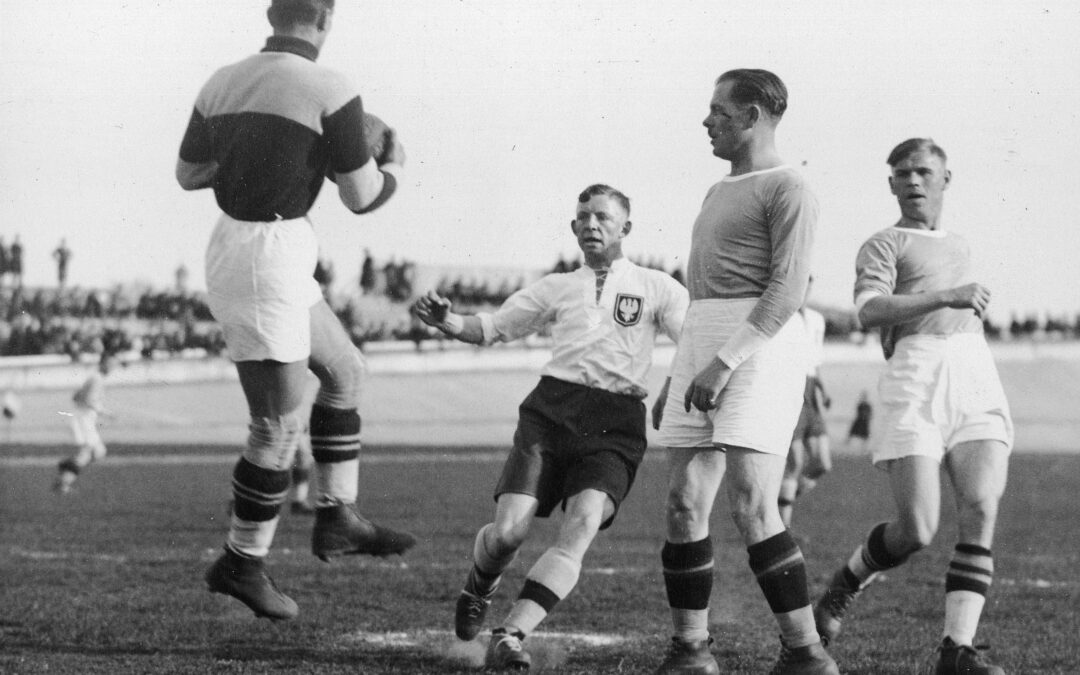Keep our content free from ads and paywalls by making a donation to support our work!

Notes from Poland is run by a small editorial team and is published by an independent, non-profit foundation that is funded through donations from our readers. We cannot do what we do without your support.
By Daniel Tilles
Possibly the greatest footballer in Poland’s history, but now largely forgotten, Ernest Wilimowski’s story is one of glory, betrayal and the upheaval of Central Europe’s tragic 20th century.
There is nothing football fans hate more than a traitor. Think of Barcelona supporters throwing a pig’s head at Luis Figo during a match after he moved to arch-enemies Real Madrid. Or Tottenham Hotspur fans burning an effigy of Sol Campbell when he ran down his contract and moved to North London rivals Arsenal on a free transfer.
But it would be hard to find a greater example of betrayal than that of Ernest Wilimowski. After being the Polish national team’s star player in the 1930s, during World War Two he switched allegiance and played eight matches for Nazi Germany, which was brutally occupying Poland.
After the war, Wilimowski never returned to Poland, whose football association wiped his name from the record books. However, recent years have seen renewed interest in the footballer, and greater sympathy towards the difficult choices he – like many from the region of Silesia on the Polish-German border – faced during the war.
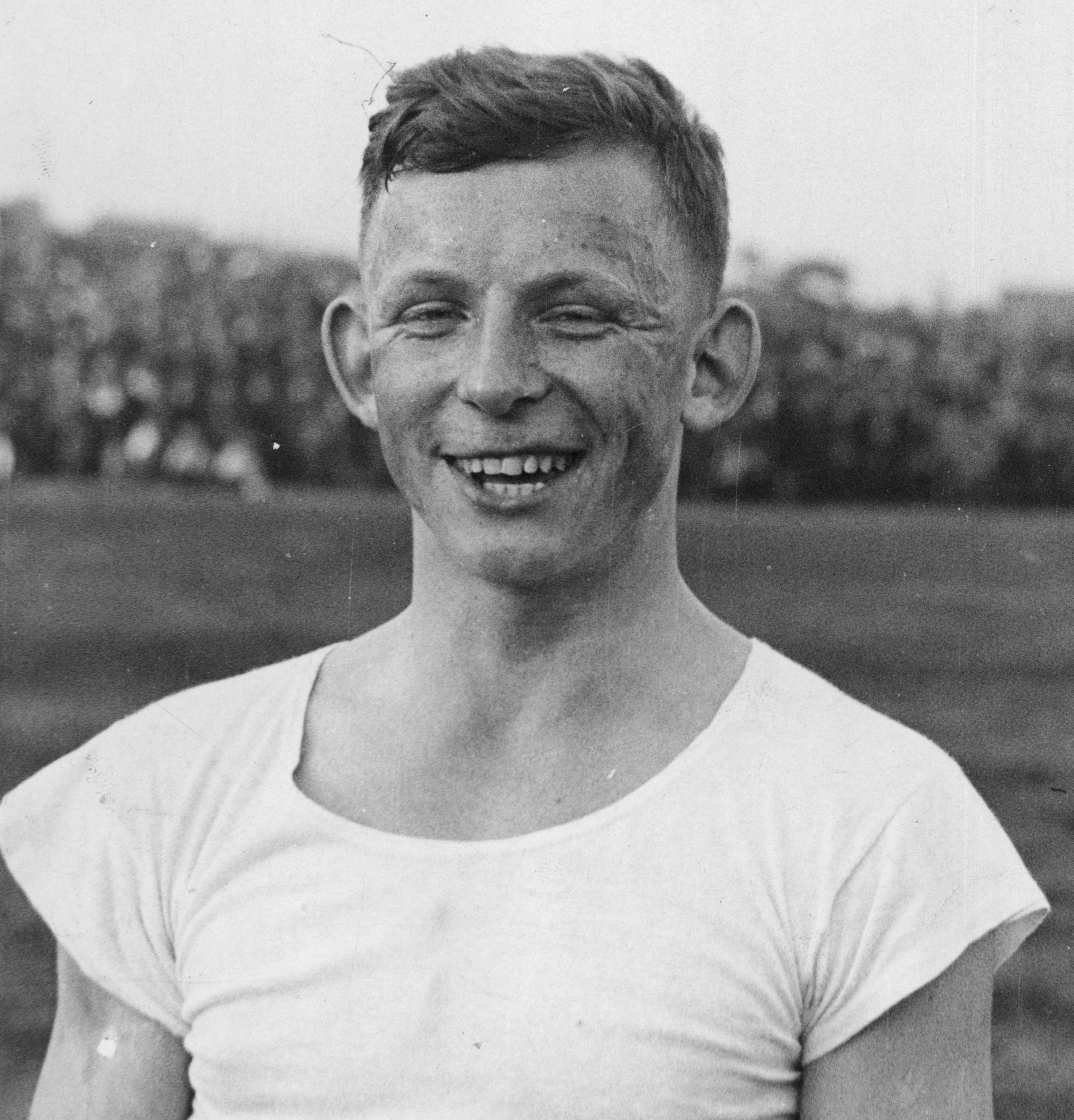
Poland’s greatest?
“Beyond any doubt, he was the best Polish footballer in history,” wrote sports journalist Andrzej Gowarzewski about Wilimowski. “Perhaps if the World Cup had taken place [as planned] in 1942, we would not be talking about Pelé today, but about him.”
It is always hard to compare the relative abilities of players across generations, especially as far back as the interwar period, when little action was recorded on camera for posterity. But there is no doubt that, prior to the outbreak of war, Wilimowski was on his way to becoming one of Poland’s – and perhaps the world’s – all-time greats.
Renowned for his pace, dribbling ability and finishing (a quality he reportedly ascribed to having been born with six toes on his right foot), he smashed goalscoring records in the Polish domestic league – including scoring ten in one match.
In six seasons between his debut in 1934 and the outbreak of war in 1939, he hit 117 goals in 86 league matches, winning the league four times in that period and finishing as its top scorer four times too. He also starred for the Polish national team, with 21 goals in 22 matches.
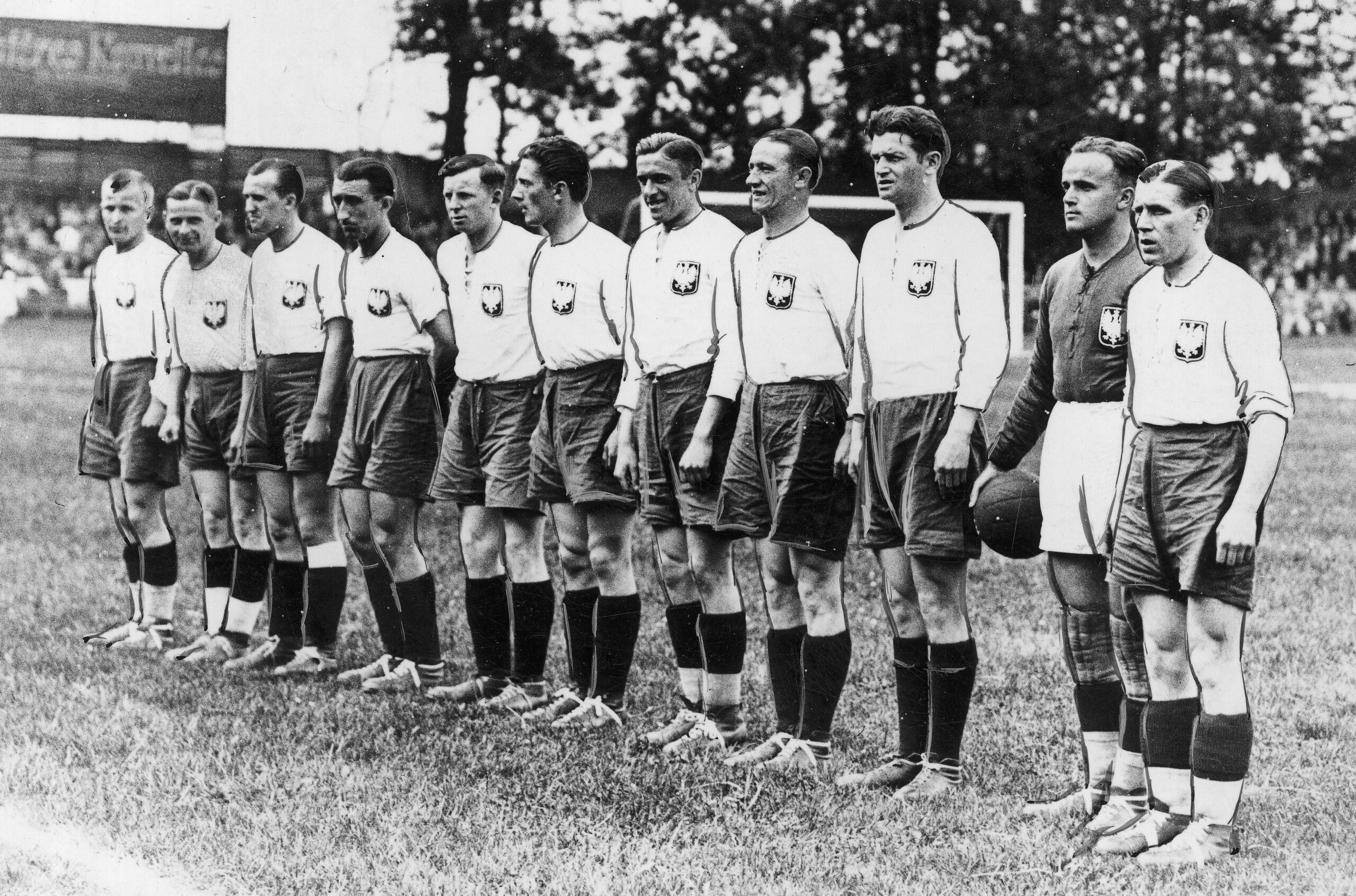
Wilimowski (fifth from the left) with the Polish national team at the 1938 World Cup in France
He was not selected for the 1936 Berlin Olympics, at which the Polish men’s football team finished fourth, reportedly because he had turned up drunk for a match before the tournament. However, journalist Zbigniew Rokita, who has written extensively about Wilimowski, says the real reason was his origins in Silesia, a historical region on the border between Poland and Germany.
Last year, in an article about Wilimowski, the Polish Football Association (PZPN) confirmed that he had not been selected in 1936 because the football authorities were concerned that a player who had begun his career at a club representing Poland’s German minority (more on that below) “did not guarantee worthy representation of Poland at the Olympics” in Germany.
However, two years later, Wilimowski was not only selected by Poland for the 1938 World Cup in France but starred there, scoring four goals in one match against Brazil.
So impressive was Wilimowski’s performance that clubs in Brazil sought to sign him afterwards. He reportedly even signed a pre-agreement to move there, but the transfer later collapsed.
Wilimowski was the first player ever to hit four goals in a single match at the World Cup and his record stood until 1994, when Oleg Salenko scored five for Russia against Cameroon. Among all European players in history to have played at least 100 minutes at major tournaments (World Cups and European Championships), none has scored goals faster than Wilimowski’s average of one every 30 minutes.
On 27 August 1939, the striker played what would turn out to be his last match for Poland, scoring a hat-trick in a 4-2 victory over World Cup runners-up Hungary. Five days later, Nazi Germany invaded Poland.
Polish, German or Silesian?
For most of Poland’s population, the six years of occupation that followed was a living nightmare. Six million Polish citizens died, representing 17% of the prewar population. That was a higher proportional death toll than any other country during the war.
Jews were targeted in particular: around 90% of the almost 3.5 million Jews who had lived in Poland before the war were killed. But ethnic Poles also suffered brutal subjugation and often extermination, dying in their millions.
Wilimowski, however, fell under the special, privileged category of Volksdeutsche, a term used by Nazi Germany to refer to people in occupied territories who were seen as having German cultural origins.
He had been born as Ernst Otto Pradella in 1916 in the city now called Katowice but which was then known as Kattowitz and was part of the German Empire. It is also at the heart of Silesia, a region that is now almost entirely in Poland but parts of which have also been under German, Austrian and Czech rule at various times.
In 1922, the area of Upper Silesia in which the young Ernst was living became part of the recently re-established state of Poland, and he became a Polish citizen. At the age of 13, he was formally adopted by his stepfather, Roman Wilimowski, an ethnic Pole, taking his surname and beginning to use the Polish spelling of his first name. (Ernest, as he was now known, never met his biological father, who died fighting in the First World War.)
Like many others in the region, the young Wilimowski used a mix of languages in various contexts, speaking Polish, German and also Silesian. He saw himself as a Silesian rather than a Pole or German, notes Rokita.
After beginning his career playing for FC Katowice, a team associated with the area’s German population, Wilimowski was in 1933 signed by Ruch Hajduki Wielkie (today known as Ruch Chorzów), the reigning top-flight champions.
1. FC Kattowitz in 1925. The little chap kneeling on the right-hand side is a 9 year old Ernest Wilimowski pic.twitter.com/9x7mSTISGJ
— Christopher Lash (@rightbankwarsaw) September 18, 2015
The club’s name (with ruch meaning “movement” in Polish) referred to the Silesian insurrectionist movements of the time and the blue colour on its shirt came from the Silesian flag. The 17-year-old Wilimowski made his debut for Ruch in January 1934, going on to score 34 goals in 21 matches that year as the club retained the league title.
In May 1934, Wilimowski made his debut for the Polish national team, becoming its youngest ever player at the time. Two days later, he scored his first international goal in a match against Sweden. During the 1930s, Wilimowski also played six games for Silesia, a team that represents the region but does not play officially recognised international matches.
By 1939, the 23-year-old Wilimowski was at the peak of his powers, leading the scoring charts with an incredible 27 goals in just 13 matches to take Ruch to the top of the league before the season was cancelled due to the German invasion.
Playing for the Reich
At the outbreak of the war, Wilimowski was entered onto the so-called Volksliste of those seen as having German identity, once again taking the first name Ernst and adding a letter to his surname, now Willimowski, to Germanise it.
In 1940, he moved to Saxony in the Third Reich, where, to avoid military service, he worked as a policeman and continued his football career. In 1942, while playing for 1860 Munich, he won the German cup, scoring the opening goal in the final and finishing the tournament as its top scorer, with 14 goals.
Wilimowski’s performances saw him called up to play for the German national team, which during the war played matches against other countries that were part of the Nazi sphere of influence. By 1942 (when the national team suspended its activities), Wilimowski had appeared eight times for the Third Reich, scoring 13 goals.
He remains the only player in history to have scored both for and against Germany, after earlier netting against them while playing for Poland in 1934.
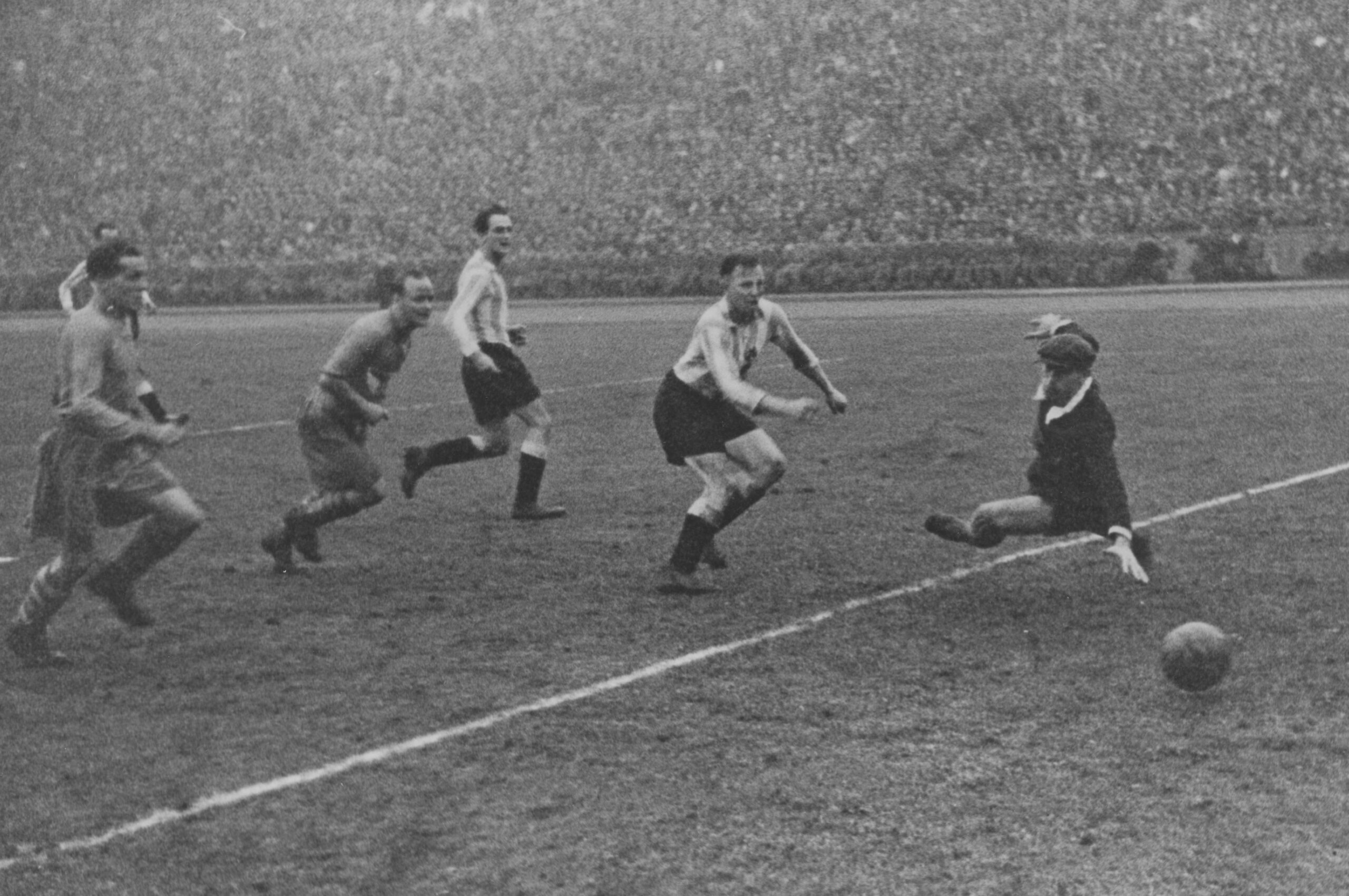
Wilimowski (second from right) scoring a goal in the 1942 German cup final while playing for 1860 Munich
Despite his privileged position, Wilimowski was not entirely immune from the horrors of the war: in 1942, his mother, Paulina Wilimowska, was imprisoned at Auschwitz, reportedly because she became involved in an intimate relationship with a Jew. She is believed to have survived the camp thanks to the intervention of legendary German fighter pilot Hermann Graf, who had become friends with Wilimowski.
In the final years of the war, Wilimowski himself joined the German armed forces, though he continued playing football, including for Mölders Krakau, a team created by the occupying Germans in the Polish city of Kraków.
After the war, Wilimowski was refused permission to return to Silesia – now almost entirely part of Poland – by the Polish authorities, who regarded him as a traitor. For decades, his records were erased from the official history of Polish football.
He instead remained in Germany, resuming a football career that saw him continue playing well into his 40s. However, he appeared in lower-level regional leagues, never reaching his previous heights – though continuing to have a fine goalscoring record.
In 1995, Wilimowski was offered the opportunity to return to Poland for the first time since 1939, after being invited to celebrate the 75th anniversary of the founding of his former club, Ruch Chorzów. However, after the idea prompted criticism in Poland, and after Wilimowski’s wife fell ill, he decided not to attend.
Wilimowski died two years later in his adopted hometown of Karlsruhe. At his funeral, a delegation from the German Football Association laid a wreath. No one from the Polish Football Assocation attended.
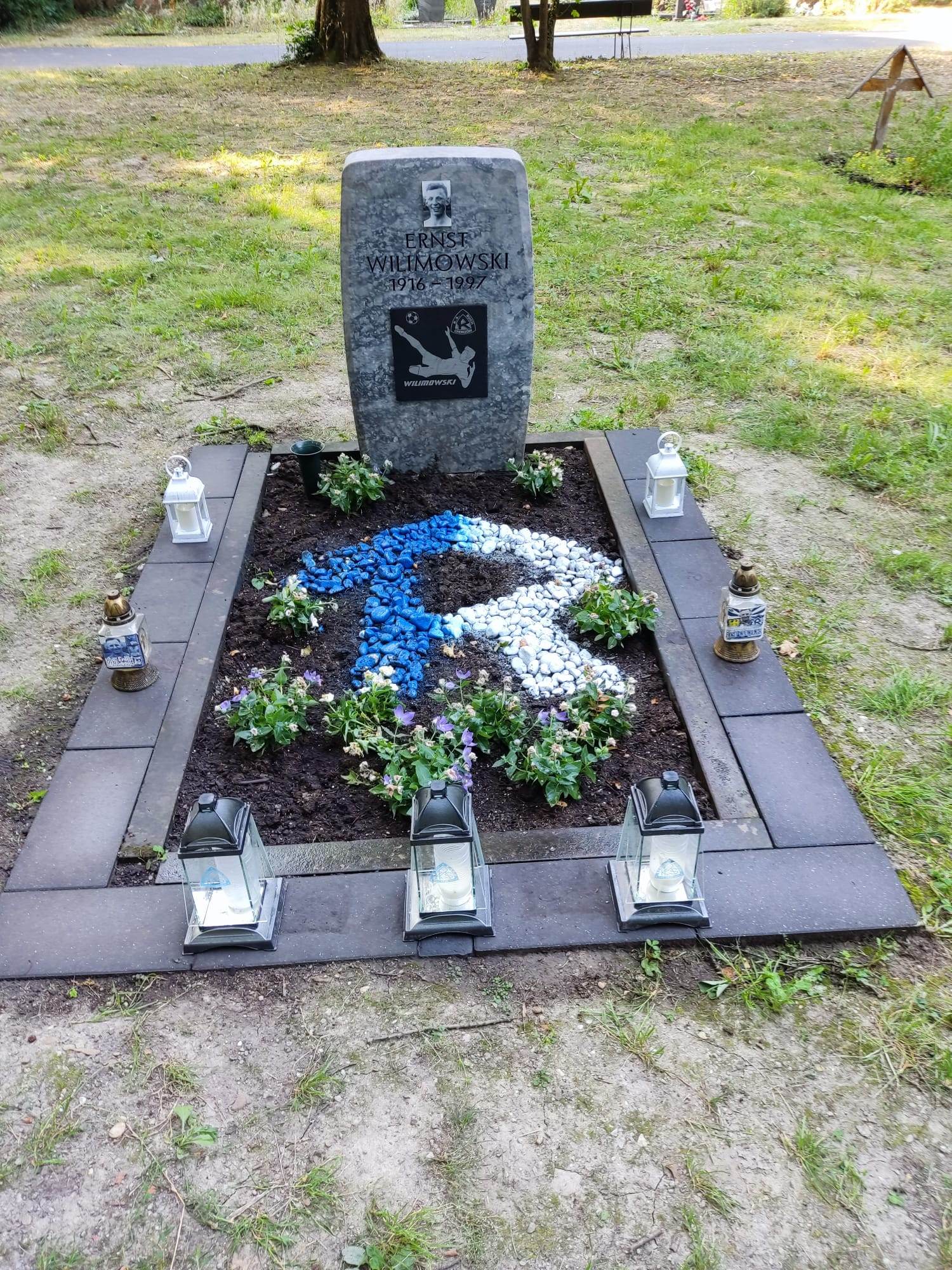
Wilimowski’s grave in Karlsruhe, featuring the logo of his former club in Poland, Ruch (image credit: Lukasz2/Wikimedia Commons, under CC BY 4.0)
Traitor or legend?
Wilimowski remains a controversial figure in Poland’s football history. While his phenomenal talent is not disputed, he continues to be regarded as a traitor by many in a country where the horrors of World War Two remain etched vividly into collective memory.
“We were here in Poland, fighting underground, and he is playing in German colours. So the word ‘traitor’ is not completely out of place,” said legendary Polish sports journalist Bohdan Tomaszewski, who was among those who strongly criticised the idea of Wilimowski visiting Poland in 1995. However, Tomaszewski also described the forward as “probably the most spectacular Polish footballer” he had ever watched play.
Others, however, argue that Wilimowski did what he had to do to survive amid the horrific context of the war. As Rokita, the journalist, puts it: when Wilimowski chose to play for Nazi Germany, he effectively agreed to “a simple deal: the better he kicks the ball, the greater the chance he will live to see the end of the war.”
Miljenko Jergović, in his book Wilimowski, also notes how the footballer’s fate was representative of Silesians more broadly during the war:
They, Germans among the Poles and Poles among the Germans, when war broke out again and forced them to reduce their dual or triple [identity] to indivisible unity, chose to belong among whom they would have a better chance of survival, [forcing] Upper Silesians to become either criminals or martyrs. And then, with the end of the war, they will disappear, as if they had never existed and as if such people, Germans and Poles at the same time, could not exist in this world.
In a 2014 poll of almost 2,500 readers by Polish website Interia Sport, only 33% called him a “traitor” while 41% said he is “a legend of Polish football”, with the rest undecided. A 2023 poll by website Sportowe Fakty found that a majority, 57%, of readers believed Wilimowski “should be rehabilitated in the history of Polish football” while 43% did not.
Meanwhile, in Silesia, Wilimowski continues to be held in high regard. On the tenth anniversary of his death, local activists proposed naming Ruch’s stadium after him. The idea was never adopted but the club does hold an annual Ernest Wilimowski Memorial youth football tournament.
⚽ W poprzednią sobotę w hali MORiS przy ul. odbył się turniej dla dzieci organizowany przez SK 1920 Cup im. Ernesta Wilimowskiego 🏆. Udział w tym Turnieju wzięły drużyny U-14, a także pojawiliśmy się my z darmową watą cukrową 🍡 i popcornem 🍿 dla wszystkich dzieci 🤟 pic.twitter.com/I7ZdGvhPXQ
— KIBICE RAZEM (Ruch Chorzów) (@KibiceRazemRCh) December 23, 2023
Wilimowski himself hoped that he could be rehabilitated. In 1974, when the World Cup was taking place in West Germany, he visited the Polish national team at their base in Murrhardt, completely unannounced.
He approached the manager, Kazimierz Górski, telling him that, despite “them speaking so badly about me [in Poland], I didn’t do anything wrong”.
After Górski was called away, Wilimowski left him a note, in which he wrote: “May the Polish team succeed, please don’t remember me badly.”

Notes from Poland is run by a small editorial team and published by an independent, non-profit foundation that is funded through donations from our readers. We cannot do what we do without your support.
All images (apart from Wilimowski’s grave) via Narodowe Archiwum Cyfrowe (NAC) and under public domain

Daniel Tilles is editor-in-chief of Notes from Poland. He has written on Polish affairs for a wide range of publications, including Foreign Policy, POLITICO Europe, EUobserver and Dziennik Gazeta Prawna.
